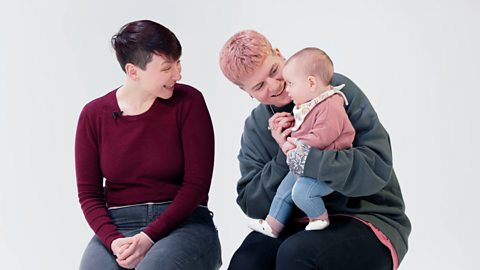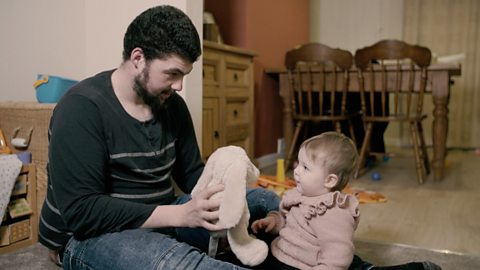Mini conversations are key to helping children develop their language skills and understand the rhythm of conversation.
Even early on, children are starting to learn the back and forth patterns that form conversations. The best way to encourage them is to give them time to respond to you.
Take a look at the video below for some tips on prompting mini conversations with your little one, no matter their age.
Ways to encourage mini conversations
- Speak to your child about what is holding their current focus. Talk to them about the world around them, sing songs and describe what they can see.
- When your babyβ―babbles, repeat the sounds back to them (e.g. "da da da"). Your baby will enjoy this - it shows them that their sounds and attempts to communicate are important.
- Get face to face to interact with them whenever possible.
- Keep talking - your child loves to hear lots of new words every day.
Use language to interact with your child in whichever way you both find fun. You could talk about something you see on the bus, or what they see when walking in a park.
Speech and language therapists often call this type of turn-taking play 'serve and return', because you can think of the back and forth interaction as being a bit like a game of tennis - you serve them some chat and they return some noise or movements when it's their turn to respond.
Using puppets for serve and return play
A sock puppet can be a great way to initiate mini conversations with your child, take a look at the video below to find out more.
Benefits of puppet play
This game is great for building a baby or child's anticipation skills and gets them used to listening to your voice. Alongside this, it helps them learn about taking turns, a key skill for communication as children begin to talk.
Not only that, it's an interactive game where your child knows what to expect and can anticipate when to get involved.
During this activity they might show excitement at the sound of voices, laugh during play or start to babble to themselves.
Key things to remember with mini conversations:
- Adapt to their level
- Watch, wait and listen
- Respond to them
- Tune in to their interests and talk about that
- Take turns
More ideas for mini conversation starters
There are all sorts of back and forth games to play with your baby to practise mini conversations.
Ready, steady, go games are an excellent way to build anticipation and turn-taking skills with your child, as they wait for you to say 'go!' You could try it by pouring out a cup of water at bath time, blowing bubbles or even ripping newspaper.
Peek-a-boo is not just a reliable way of making kids laugh, but it is also a great way to practise turn-taking and build their sense of object permanence (the idea that you don't disappear when you're out of sight).

In case you missed it
How do babies learn from peekaboo? video
Our Speech Lab film explores the reasons to play peekaboo with babies

Ready, steady, go games. video
Easy ideas for anticipation games to boost babies' listening skills.




